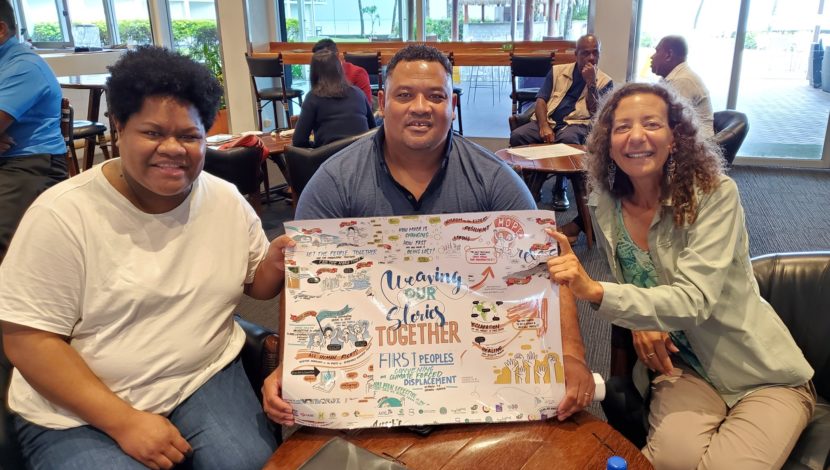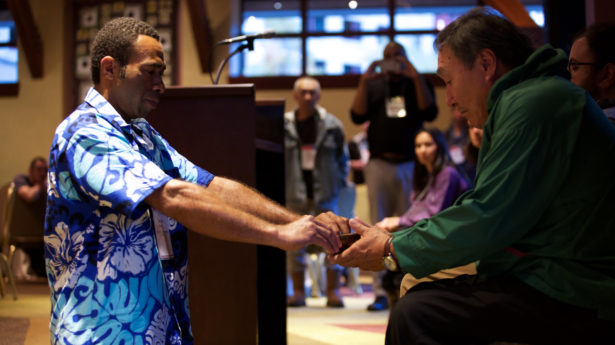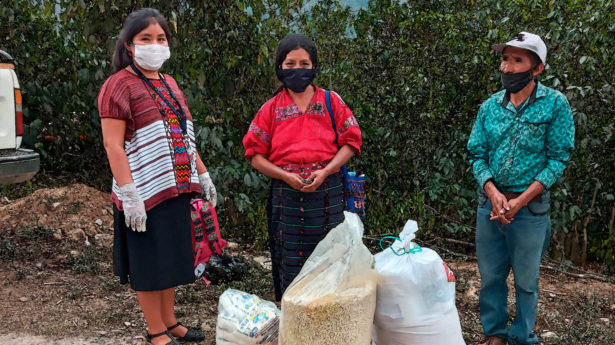The Unitarian Universalist Service Committee advances human rights through grassroots collaborations.
Celebration of First and Indigenous Peoples’ Day: Following Their Lead

By on October 9, 2020
UUSC celebrates and honors First and Indigenous Peoples for their role and leadership in advancing climate justice around the world, lifting and weaving their stories and values throughout our work to support those who are losing their ancestral homes to the climate crisis.
At the heart of our work, we join First and Indigenous Peoples in calling for the recognition of their inherent rights, respect for their Tribal sovereignty, and support in their pursuit for justice. But these aspirations are not exclusive to the issue of climate-forced displacement—First and Indigenous Peoples’ demands for recognition, respect, and justice from colonial rule spans several decades, a journey that has marked many historical events and achievements.
One of the first recorded events of this journey shared through oral history is one by Deskaheh, Chief of the Iroquois League, who in 1923, submitted to the League of Nations (which is now the United Nations) the ‘Redman’s Appeal for Justice’ calling for the League’s support to secure “recognition of his peoples’ right to self-govern; appropriate indemnity for past transgressions; just accounting of their trust funds; freedom to transit across Canada and internationally, and for the Leagues’ protection over his peoples.” Chief Deskaheh was turned away and doors closed to his face at the behest of Canada, with the backing of Australia, New Zealand, and the United States—an act which he reportedly described as “cruel indifference.” From 1923 to 1977, Indigenous Peoples had no voice in the United Nations, including in the development and adoption of the United Nations Declaration on Human Rights in 1948.
The cruel indifference that Chief Deskaheh described in 1923 still exists today, subtly manifested in various ways in our current systems. In the United States, we witness it in laws and policies that require First and Indigenous Peoples to prove their indigeneity in order to be eligible to receive federal assistance to protect themselves from the climate crisis—a crisis they didn’t create but one that disproportionately affects them. We see it through the way tribal sovereignty and the right to self-determination is systematically devalued in government policies and through the way governments use tactics of intimidation and retaliation to suppress the voices of First and Indigenous Peoples. Globally, the state-sanctioned desecration of sacred lands that allow corporations to rape Mother Earth is a manifestation that is claiming Indigenous lives. And perhaps the most obvious and widespread impact of this manifestation is in the way industrialized nations of the world are in a perpetual mode of climate negotiations while the lives and livelihoods of First and Indigenous peoples, such as those in the Pacific Islands—home to several UUSC partners—face the existential threat of climate change.
This cruel indifference is also what fuels, shapes, and informs the work and advocacy that many organizations like UUSC are doing today. First and Indigenous Peoples’ call for recognition, solidarity, equity, reparations, protection, equitable recovery, and access to information and resources are calls that UUSC and our partners are responding to, with the trust and deep relationship of First and Indigenous Peoples who inform our work.
On this Indigenous Peoples’ Day, we pay homage to Chief Deskaheh and all the First and Indigenous Peoples who have left us, who courageously demanded to be heard in the halls of power and who were met with closed doors and cruel indifference. We honor their undying commitment to defend their peoples with their head held high in a time of blatant discrimination and disregard for their existence and inherent worth.
We honor First and Indigenous Peoples who are living and those who are yet to be born and we share our commitment to respect, listen, support and follow their lead.
On this Indigenous Peoples’ Day, we invite you to open your minds, your hearts and your eyes to the cruel indifference that First and Indigenous Peoples face and to heed their call.
Vinaka vakalevu (Fijian for “Thank you very much”)
***
About UUSC: Guided by the belief that all people have inherent worth and dignity, UUSC advances human rights globally by partnering with affected communities who are confronting injustice, mobilizing to challenge oppressive systems, and inspiring and sustaining spiritually grounded activism for justice. We invite you to join us in this journey toward realizing a better future!
Photo Credit: UUSC (Fiji Site Visit, March 2020; Salote Soqo is pictured at left)

